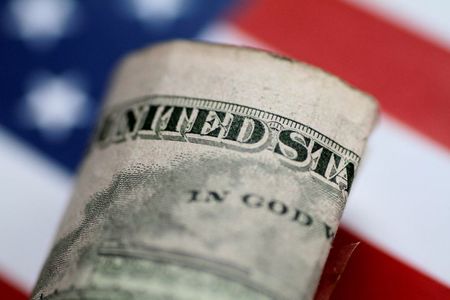By Karen Brettell
NEW YORK (Reuters) – The U.S. dollar ended unchanged on Friday, erasing an early drop after tamer-than-expected producer price inflation, with investors continuing to evaluate whether that the Federal Reserve will act sooner to snuff out inflation if it persists.
The personal consumption expenditures (PCE) price index, excluding the volatile food and energy components, increased 0.5%, below economists’ expectations of an 0.6% increase. In the 12 months through May, the core PCE price index shot up 3.4%, the largest gain since April 1992.
Consumer spending, which accounts for more than two-thirds of U.S. economic activity, held steady following an upwardly revised 0.9% jump in April. Economists polled by Reuters had forecast consumer spending rising 0.4%.
“The most interesting, salient takeaway from today’s data is that we’re not seeing runaway inflation,” said Boris Schlossberg, managing director of FX strategy at BK Asset Management in New York. “The Fed by holding its fire is probably on the right side of the trade at this point.”
Other data showed U.S. consumer sentiment ticked up in June.
The dollar index against a basket of currencies ended unchanged on the day at 91.838, after dropping to 91.524.
Last Friday, the index rose to a two-month high after Fed policymakers on June 16 forecast two rate hikes in 2023, a faster-than-expected timetable to tighten.
This week, the greenback slipped as Fed speakers offered contrasting views on inflation pressures.
The U.S. economy could possibly reach maximum employment and inflation that would merit an interest rate increase next year, but it will be important to watch the data, Boston Federal Reserve Bank President Eric Rosengren said on Friday.
Minneapolis Federal Reserve President Neel Kashkari said he expects high inflation readings will not last and many Americans will return to the labor market in the fall.
Investments that strengthen the labor force and improve economic inclusion can help boost economic growth, said Cleveland Federal Reserve Bank President Loretta Mester.
Infrastructure spending is likely to boost the U.S. economy, though probably not in the short-term.
The British pound fell 0.33% on the day to $1.3875, weakening further a day after the Bank of England made no changes to monetary policy.
The greenback was steady at 110.83 Japanese yen, after reaching a 15-month high of 111.11 on Thursday.
Data showed core consumer prices in Tokyo were unchanged in June from a year earlier.
“Japan is a total outlier when it comes to one of the most crucial data points in the market’s focus right now: inflation. It showed that Japan, unique among the major countries of the world, has no inflation,” Marshall Gittler, head of investment research at BDSwiss, said in a report.
(Reporting by Karen Brettell; Editing by David Gregorio)





